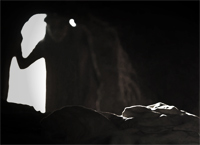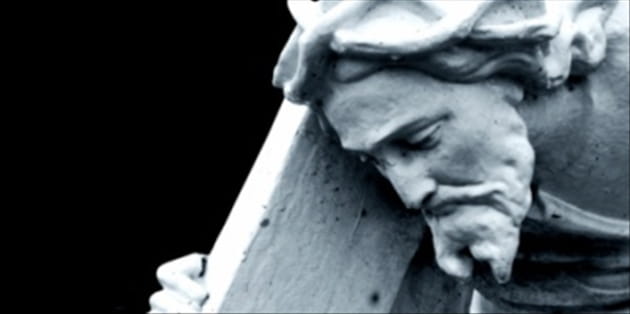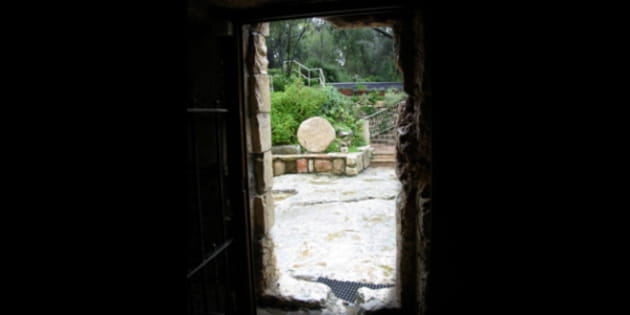Nearly all of us have been here at one time or another — embarrassed, humiliated, and heartbroken.
Some of these moments involve simple pride and embarrassment. After over 35 years of speaking around the world, I still feel the embarrassment of my first public speech. Cub Scouts... explaining our project... making a little boat... and I remember exactly what I said that night. "My name is Phil Ware and..." There was nothing said after the "and"! I stood there with my face turning red, my insides quivering, and wanting to be swallowed by a large hole in the floor. I couldn't say a word. In front of my friends and family, I shut down, then ran out... humiliated and embarrassed, vowing to never speak again. While the sting remains, my vow didn't hold... thankfully!
Some of these moments, however, involve unspeakably deep wounds that came from someone very close to us betraying us, abandoning us in our time of need, or seeking to do us harm. What makes it even harder is that at one time, they had been committed to us as a friend, business partner, or a spouse and have now used that closeness to rip our guts out. Sometimes, our humiliation is actually brought on by our own failure that brought deep wounds to others and destroyed something precious between us.
These unspeakably deep wounds can take forever to heal. They can be re-opened by a thought, a memory, a song, a poem, a smell, a place... or a jillion other things. Yes, these are unspeakably deep wounds of humiliation and hurt and failure and live with us, just under the surface of our facades.
This week, many of us have remembered Jesus on the way to the cross. He had been journeying toward the cross for quite some time. He has been warning his closest friends and followers that he must go to Jerusalem and die
(Mark 8:31-32; Mark 9:30-32; Mark 10:32-34). But now, this awful and certain future is near — the plans are underway and the dark forces behind this awful set of events are already in motion. And nearly everyone close to Jesus — whether friend or foe — is about to fail him through betrayal, denial, abandonment, mockery, and murder.
Jesus' band of friends and followers sleeps in the garden, unable to stay awake and pray with Jesus as he wrestles with his dark destiny, and as he submits himself to the will of God above his own desires and fears. Even his closest friends, Peter and James and John, cannot stay awake with him!
Judas arrives with his retinue of cowardly co-conspirators — the soldiers from the Temple and the priests there to do in the night with swords and torches what they would not dare do in the daylight. Judas betrays his Teacher, his Lord, with a kiss! He will later hang himself for betraying Jesus for 30 pieces of silver — so deep is Judas' despair with his own failure and self-humiliation.
As Jesus steps forward and offers himself to the arresting soldiers, his closest friends abandon him, desert him, and run for their lives — as the Gospel of Mark says so hauntingly,
"Then everyone deserted him and ran away" (Mark 14:50). They will eventually hole up in the upper room to hide in confusion, disarray, and despair, not once remembering his promise to rise from the dead — clueless of how or where to regain their lives from the dark night they had entered.
Peter, who had emphatically proclaimed that he would be loyal no matter what the others in their little group would do, is now about to deny his Lord for the third time. His eyes meet Jesus' eyes from across the courtyard after Peter's final betrayal. Jesus' "Rock" then hears the rooster crow. His soul is torn apart by the shearing forces of shame, confusion, and grief as he watches Jesus handed over to be crucified. Peter then breaks down and weeps uncontrollably.
There is one verse, one simple and mysterious reference in the Gospel of Mark, that speaks to all of us and to all of this — this spineless, visionless, abandonment of the Son of God. They leave him alone, abandoned to face the hosts of hell and their human partners in the Sanhedrin, the High Priest's household, Herod's rule as King of the Jews, and Pilate's procuratorship as the enforcing power behind the Roman boot of oppression.
When all Jesus' men have turned and run away from the Lord during his arrest, there is one young man who still follows. Just one. All the rest are gone. Presumably referring to himself, John Mark, the author of the Gospel, writes:
And a young man, with nothing but a linen garment, was following Jesus. When they seized him, he fled naked, leaving the garment behind (Mark 14:51-52).
These are intriguing verses. Two haunting verses that serve as powerful reminders of the dangers of the night for Jesus' friends and followers. They are also reminders of the absolute "aloneness" that Jesus faces as he goes through the barbaric hours ahead. And for Mark, they become a way to say, "We were all exposed and naked, failures and disappointments to ourselves and to Jesus. Revealed for what we were — pretenders and not protectors, fearful instead of faithful, and forsakers instead of friends. Seen for what we were, there was nothing left to do but hide in fear!"
Jesus' closest friends are exposed in the naked light of truth! Embarrassed. Humiliated. Hiding.
Jesus goes to face his own naked light of truth on Golgotha. He will be stripped of clothes three times before the ordeal is done.
- He is first stripped of his clothes so they can put a purple robe on him, strike him with rods, spit upon him, and mock him (Mark 15:17-19).
- He is then stripped of his purple robe and his clothes placed back on him (Mark 15:20).
- He is stripped a third time, this time given nothing to wear so he would hang naked and exposed, humiliated and battered, as he died before a hostile, morbidly gleeful crowd of onlookers while the soldiers cast lots to see who would win his clothes (Mark 15:24).
Jesus dies alone... humiliated... brutalized... and exposed for all the world to see. No secrets. No hidden wounds — just gaping, horrid, fully exposed wounds. No privacy. No modesty. Inhumanity proudly displaying its latest victim, writhing in the throes of death, alone, on a barbaric tree, for all of us and in front of all of us.
And the connection of grace that transforms these moments of humiliation?
The redeeming virtue in all of this brutality, inhumanity, and barbarism?
Two truths, both powerfully symbolized by the garments left behind.
First come the garments of humiliation... the dark night of humiliation... now shared humiliation... seen in the garments left behind by John Mark and Jesus' garments gambled over by unnamed soldiers.
For all of us who have had those moments of embarrassment, humiliation, abandonment, and failure, we find Jesus meeting us in the darkness of our worst moments, when we are fully exposed, naked before the world in our own failure. Jesus hangs there, letting us know that he knows what it is like to be there — exposed, humiliated, and alone to face those who mock us. For every John Mark that has run away, naked in the night, afraid of tomorrow, fully humiliated and embarrassed, Jesus speaks softly, with arms outstretched, and says: "See, look at my scars. I received them before the eyes of every gawker and every mocker. I know how it feels, but I am here to let you know how it heals!"
Next come the garments of grace... of hope and life and new days with bright dawns.
Early on Sunday morning, while it was still dark, Mary Magdalene came to the tomb and found that the stone had been rolled away from the entrance. She ran and found Simon Peter and the other disciple, the one whom Jesus loved. She said, “They have taken the Lord’s body out of the tomb, and we don’t know where they have put him!”
Peter and the other disciple started out for the tomb. They were both running, but the other disciple outran Peter and reached the tomb first. He stooped and looked in and saw the linen wrappings lying there, but he didn’t go in. Then Simon Peter arrived and went inside. He also noticed the linen wrappings lying there, while the cloth that had covered Jesus’ head was folded up and lying apart from the other wrappings. Then the disciple who had reached the tomb first also went in, and he saw and believed... (John 20:1-8 NLT).
Jesus left behind his garments of death! The grave clothes, the linen cloth that Jesus was wrapped in — just like the linen cloth John Mark had stripped off him — are left behind. The cloth for his head is neatly folded. There is no rush, no fear, no worry for the risen Son of Man. He neatly folds this head piece as testimony for those who find it. "I am risen," it says, "and I am alive for you!"
What powerful symbol!
What powerful truth!
What powerful hope!
Our task is to leave behind the garments of humiliation, failure, and death as we look in the empty tomb of Jesus and see the garments the risen Lord left behind — to leave those behind and believe!
Humiliation has faded into gray, and fresh hope has dawned, bringing the promise of new life, clothed in Christ and his righteousness!
No wonder the apostle Paul tells us:
Therefore, if anyone is in Christ, the new creation has come: The old has gone, the new is here! (2 Corinthians 5:17 NIV).
Resurrection happens, not just for Jesus, but for all of us who need fresh hope after our own failures and humiliations!
But how can this be so? How can this be true?
It is because we've left the garments of sin and death behind, and by faith we have clothed ourselves in the garments of resurrection!
So in Christ Jesus you are all children of God through faith, for all of you who were baptized into Christ have clothed yourselves with Christ(Galatians 3:26-27 NIV).
Do you know what it is like to be humiliated, exposed as a failure, and an embarrassment to yourself and to all who know you?
Do you know what it is like to disappoint yourself or others in how you've handled a painful and difficult time?
Do you wrestle with doubts about your value or worthiness and feel that everyone sees you as less than what you want to be?
Do you struggle with the painful loss of someone you love and crave one last word, one last moment to say what was left unsaid or to fix one last thing that was left unfinished between you?
None of us — not you, not me — none of us has to keep wearing our garments of loss, shame, failure, and disappointment anymore.
The angels invite us, just as they did Peter and the beloved disciple, to look into the empty tomb, to see garments of death left neatly behind, and believe a new day has dawned! Our Jesus is risen. Death has been defeated. And grace has brought life to what once held us captive!







